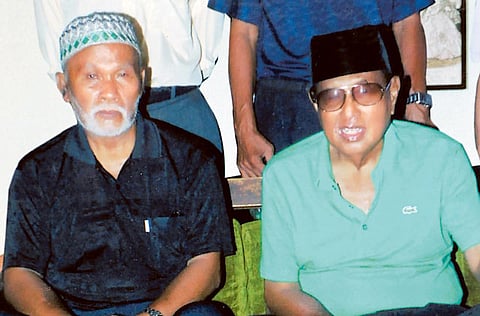Brunei’s help sought to resolve Sabah-Sulu debacle
Kiram still claiming Sabah territory in Malaysia as part of Sulu’s historic dominion

Manila: Parties seeking a resolution to the conflict between Sulu royalists and Malaysia are seeking the participation of Brunei to help end the debacle, a spokesman for Sultan Jamalul Kiram said.
Abraham Idjirani told Gulf News in an interview that representatives of the Sultanate of Brunei have expressed a willingness to talk with Kiram except for one party in the mediation process which does not want to take part.
“Malaysia is not willing to engage us in talks,” Idjirani said.
Observers said this reaction from Malaysia has been expected as engaging the Sultan of Brunei or the Philippine government would give a semblance of legitimacy to the Sulu Sultanate’s claim.
Earlier, Philippine Senator Miriam Defensor-Santiago, an expert in international affairs, suggested that the Philippines and Malaysia resolve the dispute amicably as there is a dormant claim by the Philippine government and the Sulu Sultanate on Sabah.
Kiram is claiming the Sabah territory as part of Sulu’s historic dominion but Malaysia is apparently not willing to easily part with the resource-rich territory which contains a substantial portion of Kuala Lumpur’s economic lifeline. Sabah is Malaysia’s second largest state after Sarawak.
Idjarani said the participation of Brunei in the resolution of the issue was crucial. There are historic records that show that the Sabah territory had been ceded by the Brunei Sultan in 1658 to his brother, the Sultan of Sulu in exchange for the latter’s help in resolving a rebellion.
The Sulu Sultan’s spokesman said the United States was also increasingly concerned over the Sabah issue and said President Barrack Obama had also ordered the State Department to conduct its own study on the Sulu Sultanate’s territorial claim.
“President Obama is also concerned over the issue’s implications on regional security,” he said.
Manila had tried to distance itself from the actions of the Kiram and had even threatened to file charges against the renegade Sultan and his followers.
In early February, some 200 of Kiram’s followers under the banner of the Royal Army of the Sultanate of Sulu (Rass) arrived in force in Sabah’s Lahad Datu and said they were enforcing the Sultanate’s claim on the territory. What followed was weeks of hostilities that resulted in dozens of fatalities, mostly Kiram’s men.
During the Gulf News interview, Idjirani also belied Malaysian government claims that Raja Muda Agbimuddin Kiram, the brother of the Sultan who led the Rass expedition had already fled from Sabah and returned to Mindanao’s Tawi-Tawi.
Malaysia’s official Bernama news agency said on Friday that Raja Muda, crown prince of the sultanate, had abandoned his followers.
Idjurani said this report was mere “black propaganda” by the Malaysian government.
Sign up for the Daily Briefing
Get the latest news and updates straight to your inbox



